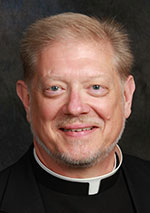That All May Be One / Fr. Rick Ginther
Good Friday prayers are filled with God’s hope for salvation
 Good Friday is three weeks away.
Good Friday is three weeks away.
The Good Friday Service is a unique liturgy. There are four “movements” if you will: Liturgy of the Word, Intercessions, Adoration of the Cross and Communion.
Let’s focus on the second movement.
There are 10 intercessions. Each begins with a call to prayer by a deacon, lector or cantor. After silence (with kneeling if possible), all rise and the presiding priest or bishop prays the actual prayer.
These intercessions originated in Rome during the early centuries of the Church and have endured.
Intercessions one through four focus upon all those in communion with Rome: the Church, pope, faithful and catechumens.
Good Friday essentially celebrates Jesus’ triumph on the cross. The Resurrection culminates the paschal mystery. The resultant gift of salvation was and is universal.
It is in this context that we pray intercessions five through eight.
How does the Church pray that others share in the gift of salvation?
Without quoting in entirety the full text of each of the remaining intercessions, let’s consider the basic thrust of each in the words of the Church at prayer.
Prayer for Christian Unity. The invitation: “… for all our brothers and sisters who believe in Christ, that our God and Lord may be pleased, as they live the truth, to gather them together and keep them in his one Church.”
The prayer: “… that those whom one baptism has consecrated may be joined together by integrity of faith and united in the bond of charity.”
Prayer for the Jewish People. The invitation: “… that [God] may grant them to advance in love of his name and in faithfulness to his covenant.”
The prayer: “… God, who bestowed your promises on Abraham and his descendants, graciously hear the prayers of your Church, that the people you first made your own may attain the fullness of redemption.”
Prayer for Those Who Do Not Believe in Christ. The invitation: “… that, enlightened by the Holy Spirit, they, too, may enter on the way of salvation.”
The prayer: “… God, grant to those who do not confess Christ that, by walking before you with a sincere heart, they may find the truth and that we ourselves, being constant in mutual love and striving to understand more fully the mystery of your life, may be made more perfect witnesses to your love in the world.”
Prayer for Those Who Do Not Believe in God. The invitation: “… that, following what is right in sincerity of heart, they may find the way to God himself.”
The prayer: “… God, who created all people to seek you always by desiring you and, by finding you, come to rest, grant, that … all may recognize the signs of your fatherly love and the witness of the good works done by those who believe in you, and so in gladness confess you, the one true God and Father of our human race.”
My, I do love these prayers! They are so filled with hope and the fulfillment of God’s design for salvation.
Part of that design is benign mystery. This mystery unfolds through many agents.
God is active in each prayer. The Church proclaims its longing for all to find a way to salvation. All who are fully a part of the Church are responsible for revealing Christ and God by our prayer and witness.
Once again, the reciprocal “law of prayer is the law of belief”—an ancient principle in the Church—is on display.
May our lived belief help to bring about that for which we pray.
A blessed Holy Week and Happy Easter!
(Father Rick Ginther is director of the archdiocesan Office of Ecumenism and Interreligious Affairs. He is also the pastor of Our Lady of Lourdes Parish in Indianapolis.) †
 Good Friday is three weeks away.
Good Friday is three weeks away.